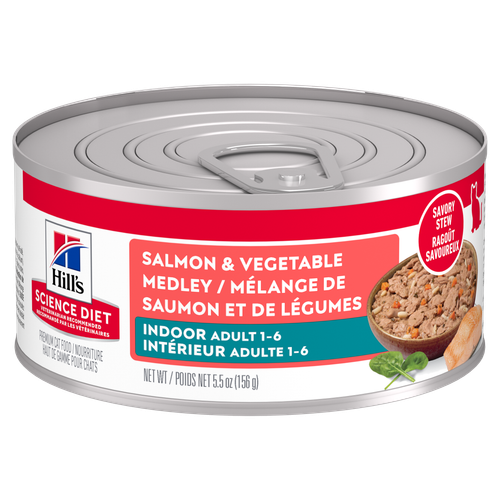
-
Find the right food for your petTake this quiz to see which food may be the best for your furry friend.Find the right food for your petTake this quiz to see which food may be the best for your furry friend.Featured products
 Adult Perfect Weight & Joint Support Hearty Vegetables and Tuna Stew Dog FoodShop Now
Adult Perfect Weight & Joint Support Hearty Vegetables and Tuna Stew Dog FoodShop Now Healthy Cuisine, Adulte, assortiment de conserves
Healthy Cuisine, Adulte, assortiment de conservesHill's Science Diet Healthy Cuisine Variety Pack
Shop Now Sensitive Stomach & Skin, assortiment de conserves
Sensitive Stomach & Skin, assortiment de conservesHill's Science Diet Sensitive Stomach & Skin Variety Pack
Shop NowFeatured products Kitten Sensitive Stomach & Skin Salmon & Vegetable Stew
Kitten Sensitive Stomach & Skin Salmon & Vegetable StewSupports kitten growth, digestive health, nourishes skin and promotes a lustrous fur
Shop Now Adult Indoor Salmon & Vegetable Medley Cat Food
Adult Indoor Salmon & Vegetable Medley Cat FoodPrecisely balanced nutrition for indoor cats with the delicious taste of savory salmon and vegetables
Shop Now Adult Urinary Hairball Control Savory Chicken Entrée cat food
Adult Urinary Hairball Control Savory Chicken Entrée cat foodSupports the health of the whole urinary system with optimal levels of magnesium
Shop Now -
Dog
- Dog Tips & Articles
-
Health Category
- Weight
- Food & Environmental Sensitivities
- Urinary
- Digestive
- Joint
- Kidney
- Dental
- Cancer
-
Life Stage
- Puppy Nutrition
- Adult Nutrition
- Senior Nutrition
Cat- Cat Tips & Articles
-
Health Category
- Weight
- Skin & Food Sensitivities
- Urinary
- Digestive
- Kidney
- Dental
- Stress
- Cancer
-
Life Stage
- Kitten Nutrition
- Adult Nutrition
Featured articles Pet Food Storage Tips
Pet Food Storage TipsDiscover how and where to store your dry, as well as canned, dog and cat food. Learn how to find the "best before" dates on all Hill's pet food packaging.
Read More The Incredible Science Behind Your Pet's Microbiome
The Incredible Science Behind Your Pet's MicrobiomeLearn what a pet's microbiome is, how it contributes to your pet's gut & overall health, and why nutrition is important in maintaining healthy microbiomes.
Read More Compare Your Pet Food's Calories to Other Brands
Compare Your Pet Food's Calories to Other BrandsCompare Hill's Science Diet dog and cat food's calories against other pet food brands and AAFCO recommended maximum calorie count.
Read More -


Are you wondering how to go about trimming your dog's nails? If so, know that many pet parents who are in charge of grooming their dogs are curious about the very same thing. Whether you just adopted your first pet, or have been anxious about whether you've been doing it correctly all along, it's important to learn how to clip your dog's nails correctly.
What Are the Benefits of Trimming Your Pet's Nails?
Before attempting to trim your dog's nails, take some time to understand why you cut them in the first place. Unlike human pedicures, where nails are trimmed and polished and come with a quick foot massage, dog pedicures are done so the nail doesn't grow too long. An overgrown nail is the catalyst for many health issues. Think about what happens when a long nail touches the ground every time your dog takes a step: force is exerted back into his tendons, which causes an uncomfortable pressure while walking, says the American Kennel Club. Over time, this may cause alignment issues that affect not only your dog's foot, but also his weight distribution — which then affects many other joints and muscles in the body.
Long nails can also split, causing pain for your pet. Plus, split nails aren't always fixed by simply trimming them. Cutting them more may cause them to splinter even farther, and you may need to get your veterinarian involved. Finally, in extreme conditions, too long toe nails can grow back into the nail pad. This often happens for older or neglected dogs that are already experiencing pain from long nails, leading them to avoid walking on hard surfaces.

Tools You Need for a Puppy Pedicure
Learning how to clip dog nails is actually quite easy if you're using the right tools. The best part is that you need very little to be successful. All you need are nail clippers, clotting powder, treats and possibly another person. Oh, and don't forget to invite your dog to the big event.
1. Nail Clippers
The first and possibly most important tool you'll need is a pair of nail clippers. There are a few different varieties you can purchase, including guillotine-, plier- and scissors-style clippers. (Don't let the names scare you.) Ask your groomer or vet for their opinion as to what clipper they recommend for your particular dog. Guillotine clippers tend to work best on small dogs, and plier- and scissor-style nail trimmers are helpful for big dogs. However, the tool you are most comfortable using is the one that will do the best job.
Nail grinders are another option if you'd rather file down the nail than cut it. Since only a small portion of nail comes off at a time with a grinder, it may be safer than clippers to avoid nicking the dog's quick (the tender blood vessel under the nail). However, grinders are often loud, leading some dogs to feel anxious or fearful around this tool. They also take much longer to finish the trim, so your pet must be patient.
2. Clotting Powder
If you cut too much of the dog's nail off, he may begin to bleed, causing a very messy and uncomfortable situation. Styptic powder, or another clotting agent your vet recommends, will stop the bleeding as soon as possible. Keep in mind that the clotting powder will only be used if your pet bleeds from cutting too close.
3. Treats
Praise for positive behavior keeps the grooming process a happy time for your pet and you. Treats are especially helpful for young or anxious dogs that are new to nail trimming. Just remember to choose healthy dog treats and praise him with an uplifting happy tone, too.


Tasty Tips
4. Another Person
While another human is optional to complete this task, you may find it helpful to call in a friend or family member to help hold your dog as you cut his nails. Similarly, if you're too nervous or have had issues in the past, you may want to leave the deed to your groomer or vet. Just be sure to make regular appointments, so your dog isn't uncomfortable between trimmings.
However, if you're feeling prepared, you can clip your pet's nails completely alone.

How to Clip Dog Nails the Right Way
A puppy pedicure is actually a fairly easy process. Simply lift and angle your pet's paw so that you are able to hold the paw and place the nail clipper (or grinder) on the excess area of nail. Then, start small. Cut off tiny sections until you're comfortable that enough has been removed. Be careful to avoid the quick. In a white nail, you should be able to see the slightly-pink shadow of the quick when you're looking from the side. A black nail is more difficult. If you're able to see a small black dot while looking straight at the cut, don't go any further. It's likely the quick is directly behind it.
However, if you're worried about clipping your dog's nails from these instructions, you can take your dog to the groomer or vet for in-person instructions. These professionals will be able to show you the same techniques in person, putting you at ease to complete the process yourself next time.
Don't forget about the dewclaw, either. Since these nails are to the side of the paw, they don't get the same traction against the ground that other nails do, says Washington State University College of Veterinary Medicine. In fact, dewclaw injuries are very common, and keeping them trimmed helps to avoid any problems. Trim them in the same manner as you just did the other nails, but keep a closer eye on them as they may need to be trimmed more often.
Now that you know how to clip dog nails, you may be wondering how long (or short!) they should be once they're trimmed. It's impossible to give a precise length that nails should be, since dogs come in all shapes and sizes, but the best indication that the nail is of correct length is that it doesn't touch the floor when his paw is down. If you can hear your pup click, click, click his way over to you, those nails likely need to be trimmed


Erin Ollila believes in the power of words and how a message can inform—and even transform—its intended audience. Her writing can be found all over the internet and in print, and includes interviews, ghostwriting, blog posts, and creative nonfiction. Erin is a geek for SEO and all things social media. She graduated from Fairfield University with an M.F.A. in Creative Writing. Reach out to her on Twitter @ReinventingErin or learn more about her at http://erinollila.com.
Related products

Gentle on stomachs while nourishing skin & supporting development in growing puppies

Hill's Science Diet Healthy Cuisine Variety Pack


Hill's Science Diet Sensitive Stomach & Skin Variety Pack
Related articles

Discover fun and engaging games and other ways to help your dog exercise, keeping him happy and healthy.

Gather the following puppy supplies to prepare your family for all the fun (and commitment) that comes with being a dog parent.

Learn how to stop your dog from begging at the dinner table, and understand how it can help contribute to his health.

Proper nutrition for your pregnant or nursing dog is vital to her and her puppy's health. Learn what you should do provide her with the proper nutrients.

Put your dog on a diet without them knowing
Our low calorie formula helps you control your dog's weight. It's packed with high-quality protein for building lean muscles, and made with purposeful ingredients for a flavorful, nutritious meal. Clinically proven antioxidants, Vitamin C+E, help promote a healthy immune system.
Put your dog on a diet without them knowing
Our low calorie formula helps you control your dog's weight. It's packed with high-quality protein for building lean muscles, and made with purposeful ingredients for a flavorful, nutritious meal. Clinically proven antioxidants, Vitamin C+E, help promote a healthy immune system.

